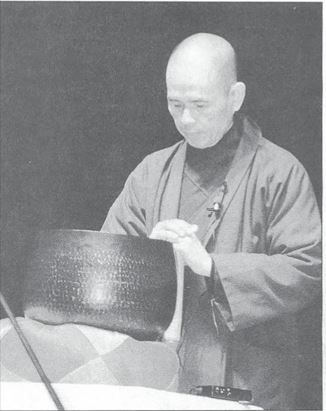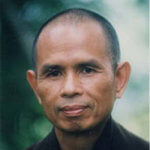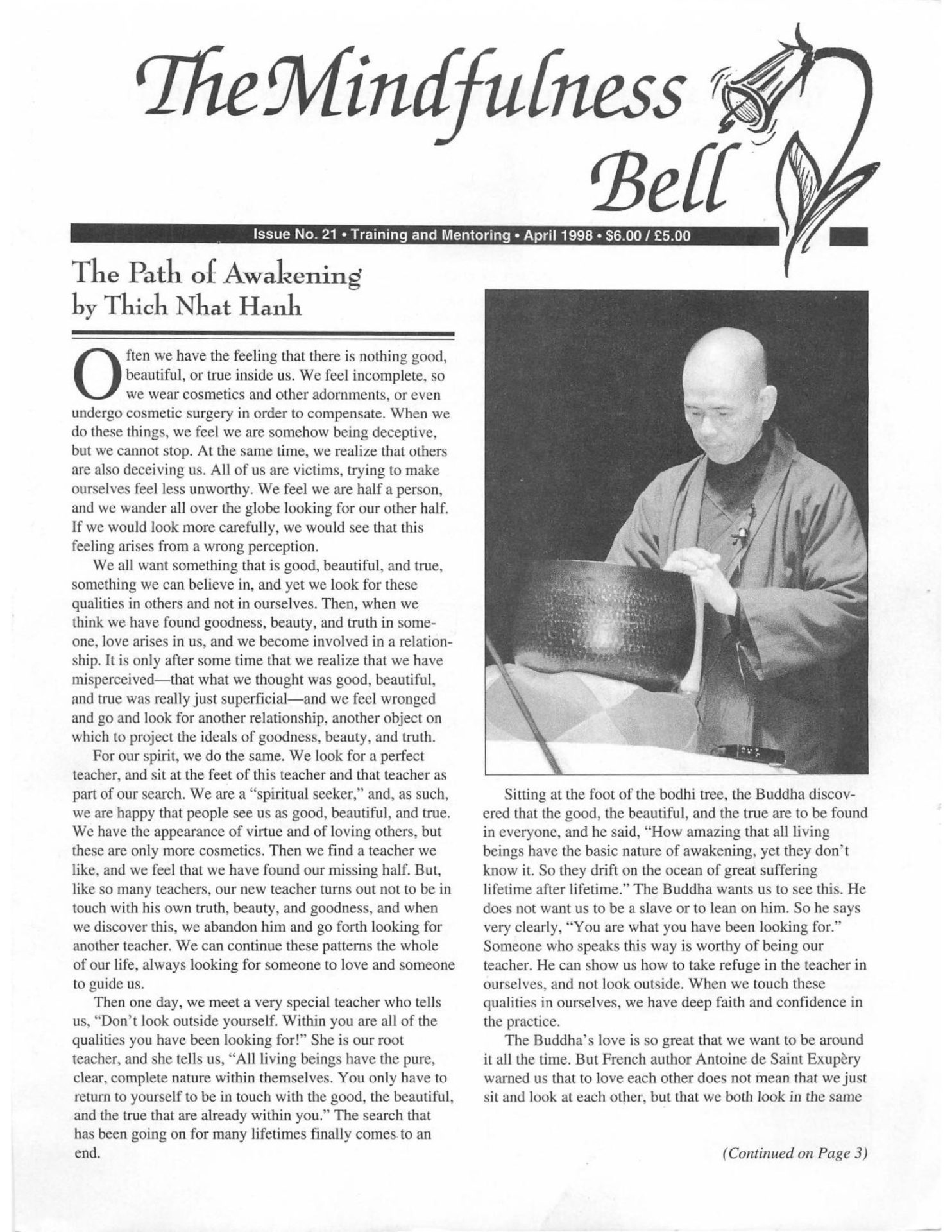Often we have the feeling that there is nothing good, beautiful, or true inside us. We feel incomplete, so we wear cosmetics and other adornments, or even undergo cosmetic surgery in order to compensate. When we do these things, we feel we are somehow being deceptive, but we cannot stop. At the same time, we realize that others are also deceiving us. All of us are victims, trying to make ourselves feel less unworthy. We feel we are half a person,
Often we have the feeling that there is nothing good, beautiful, or true inside us. We feel incomplete, so we wear cosmetics and other adornments, or even undergo cosmetic surgery in order to compensate. When we do these things, we feel we are somehow being deceptive, but we cannot stop. At the same time, we realize that others are also deceiving us. All of us are victims, trying to make ourselves feel less unworthy. We feel we are half a person, and we wander all over the globe looking for our other half. If we would look more carefully, we would see that this feeling arises from a wrong perception.

We all want something that is good, beautiful, and true, something we can believe in, and yet we look for these qualities in others and not in ourselves. Then, when we think we have found goodness, beauty, and truth in someone, love arises in us, and we become involved in a relationship. It is only after some time that we realize that we have misperceived—that what we thought was good, beautiful, and true was really just superficial—and we feel wronged and go and look for another relationship, another object on which to project the ideals of goodness, beauty, and truth.
For our spirit, we do the same. We look for a perfect teacher, and sit at the feet of this teacher and that teacher as part of our search. We are a "spiritual seeker," and, as such, we are happy that people see us as good, beautiful, and true. We have the appearance of virtue and of loving others, but these are only more cosmetics. Then we find a teacher we like, and we feel that we have found our missing half. But, like so many teachers, our new teacher turns out not to be in touch with his own truth, beauty, and goodness, and when we discover this, we abandon him and go forth looking for another teacher. We can continue these patterns the whole of our life, always looking for someone to love and someone to guide us.
Then one day, we meet a very special teacher who tells us, "Don't look outside yourself, Within you are all of the qualities you have been looking for!" She is our root teacher, and she tells us, "All living beings have the pure, clear, complete nature within themselves. You only have to return to yourself to be in touch with the good, the beautiful, and the true that are already within you." The search that has been going on for many lifetimes finally comes to an end.
Sitting at the foot of the bodhi tree, the Buddha discovered that the good, the beautiful, and the true are to be found in everyone, and he said, "How amazing that all living beings have the basic nature of awakening, yet they don't know it. So they drift on the ocean of great suffering lifetime after lifetime." The Buddha wants us to see this. He does not want us to be a slave or to lean on him. So he says very clearly, "You are what you have been looking for." Someone who speaks this way is worthy of being our teacher. He can show us how to take refuge in the teacher in ourselves, and not look outside. When we touch these qualities in ourselves, we have deep faith and confidence in the practice.
The Buddha's love is so great that we want to be around it all the time. But French author Antoine de Saint Exupery warned us that to love each other does not mean that we just sit and look at each other, but that we both look in the same direction. When we take the hand of the Buddha, we discover that we not only love each other, but we love all species. True love is always collective. We and the Buddha are "associate lovers," protecting ourselves and each other, being faithful to ourselves and each other, and always bringing transformation to ourselves and to many others.
Sometimes when we fall in love, we forget to look in the same direction; we just sit there and look at each other. In the time of the Buddha, a monk named Vaikali was very attached to the Buddha. Whenever he was near the Buddha, he felt peaceful and happy, and that was all he wanted. He didn't listen deeply to the Buddha's Dharma talks. He only wanted to be near the Buddha. Because of that, he was only able to touch the shadow of the Buddha, and not the Buddha's deepest aspects, great wisdom and great love.
The Buddha observed that Vaikali was not getting stronger in the practice, so he forbade Vaikali from coming near him. When the Buddha walked to the Jeta Monastery, he did not allow Vaikali to join him. And he did not allow Vaikali to be his attendant. Vaikali felt that the Buddha had cast him off, that the Buddha didn't love him anymore, and he wanted to commit suicide. The Buddha understood what was happening and he went to him and said, "Dear Vaikali, your love is sincere, but it is not the deep love of a monk. It is a superficial attachment. In yourself, deep down, there are good, beautiful. and true qualities. You should be looking for these in yourself and not running after a mere image of them in the Buddha. These qualities are the ground of your being, your basis. I always practice this way myself, and I always teach this to others." After that, Vaikali practiced properly.
A good teacher is someone who shows us that there is also a teacher in us and a student in him. We have to learn to take refuge in the teacher in us and not just be attached to the external teacher. If our teacher is a true teacher, she will always encourage us to go back to ourselves and be in touch with the true teacher within us. When we learn how to practice this way, we will never be disappointed. We will always be able to see the good, the beautiful, and the true in ourselves and others, and we won't be deceived by adornments. When we see people deceive each other, we'll only feel compassion and do our best to help them wake up.
Real beauty is always good and truthful. True goodness contains true beauty and real truth. Truth is always good and beautiful. Truth, beauty, and goodness inter-are. If what we thought was beautiful does not contain goodness and truth in it, it is not real beauty. When we love someone, we have to avoid losing contact with our own goodness, beauty, and truth, and with theirs as well, and then we won't be deceived by appearances. This is the Great Awakening. When we are awakened, we understand what the Buddha meant when he said, "How amazing that all living beings have the basic nature of awakening, yet they don't know it. So they drift on the ocean of great suffering lifetime after lifetime."
Love is a great opportunity. If it happens that you can touch the truth, beauty, and goodness in someone you love, you will be able to go back and touch the same within yourself. A true lover always helps his or her beloved do this. The same is true in the teacher-student relationship.
In the time of the Buddha, a young lady named Matanga fell in love with the monk Ananda and wanted him to disrobe and marry her. She was very sick and said that she would die if she did not have Ananda as her husband. The Buddha asked her what she loved in Ananda, and she said that she loved everything about him: his eyes, his nose, his mouth, his manner of walking, sitting, standing, and so on. The Buddha said, "You have not seen the most beautiful aspects of Ananda such as his compassion, his wisdom, his freedom, and his ideal to relieve the suffering of living beings. If you see these good and beautiful traits, you will not want to keep Ananda all for yourself. Ananda is like the sunshine. You cannot lock the beautiful sunshine in a box. Ananda will not be beautiful if you deprive him of his freedom and compassion. The only way to love Ananda is to be like him, to do the things he does."
Mantanga was healed and she asked the Buddha to ordain her as a nun. She was able to touch the ideal of freedom and compassion within herself. True love always goes together with the capacity to look deeply and to touch deeply. When your beloved focuses his attention and energy on something that he considers to be truly beautiful and good, don't try to stop him. Instead of saying, "My beloved, you are not paying enough attention to me. You are neglecting me. You have abandoned me. You do not love me," you can say, "How wonderful what you are experiencing there, my beloved! May I join you? Shall we be associate lovers?" Joining in the search for goodness is the essence of love. It is the only way to nurture and consolidate love.
Teachers and students need to be "associate lovers," helping each other and all living beings touch the goodness, beauty, and truth in themselves. This is the Path of Awakening.

This talk was given at Plum Village on November 20, 1997. It was translated from the Vietnamese by Sister Annabel Laity and edited for publication by Arnie Kotler.
Photos: First photo courtesy of Plum Village. Second photo by Jessica Tampas.
To request permission to reprint this article, either online or in print, contact the Mindfulness Bell at editor@mindfulnessbell.org.


